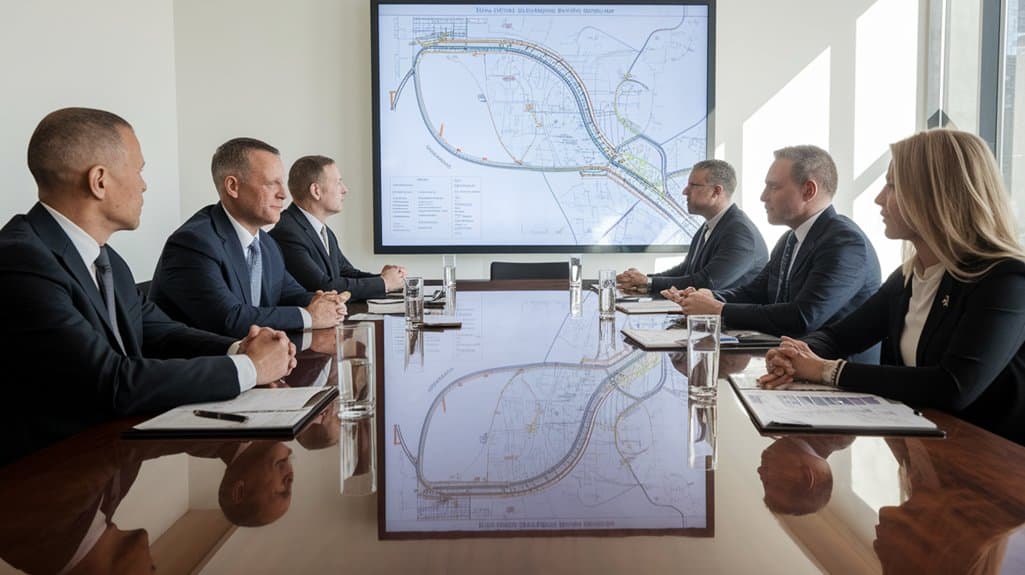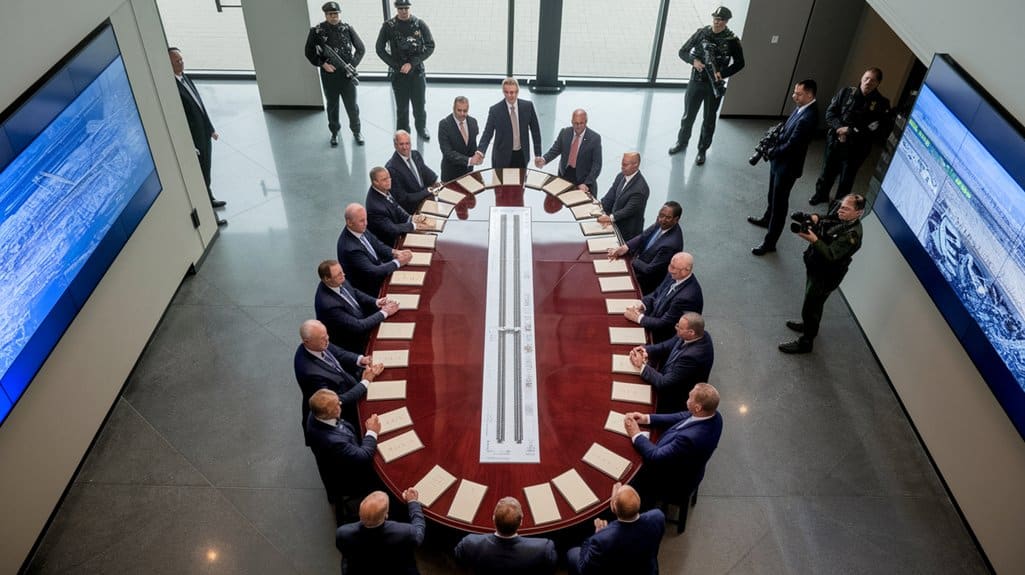The high-stakes negotiations between government officials and Grupo Vía Central over a contested rail project have entered a critical phase. At the heart of the dispute lies GVC’s substantial US$160 million claim, though technical hurdles and safety standards remain equally thorny issues. While the Ministry of Economy seeks to reduce the settlement figure, the absence of clear availability indicators threatens to derail progress. The outcome could reshape infrastructure partnerships for years to come.
Current State of Government-GVC Negotiations

As negotiations between the government and Grupo Vía Central (GVC) progress, both parties appear to be inching closer to resolving their dispute outside of arbitration. Recent meetings involving the Minister of Transport and National Director of Rail Transport have focused on establishing contractual clarity regarding the latest contract addendum’s terms. While GVC’s initial claim stands at US$160 million, negotiation strategies now center on reaching a settlement for a lower amount. The Ministry of Economy’s involvement suggests a willingness to investigate financial solutions that could influence the arbitration’s status and restore operational harmony.
Financial Implications and Investment Overview
With a staggering US$1.5 billion investment at stake, the rail project’s financial backdrop reveals the substantial commitment made by Grupo Vía Central and its consortium partners. The initiative brings together diverse investment partnerships, including Spain’s Sacyr, France’s NGE, and local powerhouses Saceem and Berkes, alongside several banking institutions.
While initial cost projections anticipated smooth operations and timely payments based on railway availability, the current arbitration claim of US$160 million highlights the intricate financial challenges facing both parties. The resolution of these matters remains essential for the project’s long-term sustainability and stakeholder confidence.
Core Issues in the Arbitration Process

The arbitration proceedings between the Uruguayan State and Grupo Vía Central stem from deep-rooted contractual disagreements that extend beyond mere financial calculations. At the heart of the dispute lies GVC’s claim of US$160 million for alleged contract breaches, while the previous administration maintains its position of non-violation. A critical point of contention centers on the absence of clearly defined availability indicators in contract modifications, as highlighted by MEF reports. This technical ambiguity has created challenges in establishing operational readiness criteria and implementing effective security measures along the railway corridor.
Technical and Operational Challenges
Beyond the financial disputes plaguing the rail project, significant technical and operational hurdles have emerged as key obstacles in implementing the railway initiative. The ongoing negotiations reveal challenges in establishing clear technical definitions and measuring operational readiness standards. These uncertainties have complicated the relationship between GVC and government stakeholders, particularly regarding safety protocols and service reliability metrics.
The absence of predefined availability indicators has created confusion about performance expectations, while security concerns along the railway route have necessitated additional discussions about preventive measures. These technical intricacies have become central to resolving the broader contractual impasse.
Security Measures and Risk Management

Security concerns have prompted extensive discussions between GVC and government officials regarding protective measures along the rail corridor. The implementation of comprehensive security protocols emerged as a priority following reports of vandalism and operational interruptions. Both parties are conducting thorough risk assessments to identify vulnerable points along the route.
The collaborative effort aims to establish robust monitoring systems while addressing the safety needs of surrounding communities. These measures form part of broader negotiations between GVC and the government, as they work to resolve contractual ambiguities and ensure the long-term viability of the US$1.5 billion investment.
Rail Project Contract Meeting
Transportation Correspondent: What’s at the core of this US$160 million arbitration claim by GVC?
Infrastructure Policy Analyst: The claim stems from alleged contractual breaches by the Uruguayan State, particularly regarding operational readiness and technical definitions. However, it’s important to note that the previous administration strongly contested these claims, backed by Ministry of Economy and Finance reports.
Transportation Correspondent: How does the US$160 million claim compare to the total project investment?
Infrastructure Policy Analyst: The claim represents roughly 10.7% of the total US$1.5 billion investment. This is significant, but we must consider that the project involves multiple international partners including Sacyr, NGE, and various banks, making the financial implications intricate.
Transportation Correspondent: What specific contractual aspects are causing the current dispute?
Infrastructure Policy Analyst: The main issue centers on undefined availability indicators in contract modifications. The MEF report specifically highlighted this absence of predetermined criteria, which creates ambiguity in evaluating performance and compensation obligations.
Transportation Correspondent: How might abandoning arbitration benefit both parties?
Infrastructure Policy Analyst: Abandoning arbitration could expedite resolution and reduce legal costs for both sides. The government’s current approach of offering a payment less than the claimed amount, while addressing security and operational concerns, suggests a pragmatic path forward that could preserve the working relationship between parties.
Transportation Correspondent: What measures are being considered to prevent similar disputes in future rail projects?
Infrastructure Policy Analyst: The current negotiations are focusing on establishing clearer technical definitions and performance indicators. Additionally, there’s increased emphasis on incorporating security measures along the railway route and creating more robust mechanisms for addressing operational interruptions.
Transportation Correspondent: Thank you for these valuable observations into this intricate infrastructure project.
Expert Biography: The Infrastructure Policy Analyst is a former senior advisor to the World Bank’s Transportation Division with over 20 years of experience in public-private partnership projects across Latin America. They hold a PhD in Transportation Economics and have published extensively on infrastructure development in emerging markets. Currently serving as a visiting professor at the University of Uruguay’s School of Engineering.
Resolving Railway Contract Negotiations

While tensions remain high over the US$160 million arbitration claim, recent negotiations between the Uruguayan government and Grupo Vía Central (GVC) have shown promising signs of resolution.
The Minister of Transport’s push for contract clarity has led to productive discussions with GVC representatives, focusing on redefining availability indicators and payment terms. Enhanced stakeholder engagement through round table meetings has helped bridge understanding between parties, particularly regarding technical specifications and operational requirements.
Both sides appear committed to abandoning arbitration in favor of a negotiated settlement, potentially involving a reduced initial payment to GVC while ensuring sustainable railway operations.



